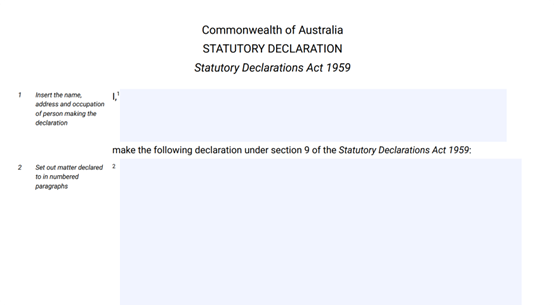Who can witness a statutory declaration?
To sum up: A statutory declaration is a document of great legal significance, and its main function is to confirm the authenticity of the content of the declaration. It is similar in nature to an affidavit, but statutory declarations are usually used outside the courtroom, which is a significant difference from affidavits in terms of application scenarios.
In Australia, there are strict rules for witnessing statutory declarations:
Only authorized witnesses, such as solicitors and justices of the peace, are permitted.
In the process of witnessing, witnesses have an important responsibility, not only to confirm the true identity of the declarant to ensure that the statement is made of their own will and identity, but also to ensure that the signature on the statutory declaration document is accurate, standardized, and in line with legal requirements.
For merchants, it is important to comply with the relevant legal requirements when using statutory declarations:
It is important to ensure that the statutory declaration is witnessed by an individual who is authorized to do so, so that the declaration can remain legally valid, otherwise it may be at risk of not being recognized by the law.
As different states or territories in Australia may differ in the specific requirements for statutory declarations, merchants should familiarize themselves with the detailed regulations of their own state or territory to avoid mistakes caused by not understanding local differences.
As a legal document that can prove important information, businesses need to use it with caution, especially to ensure that the information they prove is essential to their business operations or the legal procedures involved, so as to maintain the legality and standardization of business activities.

Understanding what a statutory declaration is?
A statutory declaration is a legal document governed by the Statutory Declarations Act. It has the effect of an oath, and making a false statement is considered perjury and can be punishable by law, up to four years in prison.
This document must:
Sign in front of an authorized witness
The content must be authentic
Use the official prescribed format
It can be used as evidence in court, but it is less effective than affidavit.
So essentially, it's a legally protected form of formal proof that replaces the cumbersome process of having to go to court to take an oath.
When do we need a statutory declaration?
In Australia, a statutory declaration is usually required in the following situations:
Personal Identity-Related:
Change your name
Proof of birth and marital status
Confirmation of loss of identification documents (passport,driver's license, etc.)
Education/Work Related:
Confirm academic qualifications
Proof of work experience
Explain gaps in your resume
Finance-related:
Request a refund
Loss of bank card/passbook
Proof of income or financial status
Immigration-related:
Proof of partnership
Proof of address
Proof of source of funds
Daily life:
Proof of renting
Loss of receipts or important documents
Insurance claims
Government Requirements:
The Centrelink
Proof of Medicare
Government subsidy application
It is important to note that in some cases the government may require a statutory declaration, while in other cases it is possible to choose to use a statutory declaration to prove certain facts.
Who can witness a statutory declaration?
Different statutory declarations often correspond to different witness requirements, which may vary depending on the specific terms of the statutory declaration you sign. Let's take a closer look at the specific differences between Australian states and territories in this regard so you can get a clearer idea of the fine print
New South Wales (NSW):
Lawyers/Legal Practitioners
notary
Justice of the Peace (JP)
Court staff
Registered Medical Practitioner
dentist
pharmacist
Certified Public Accountant
police officer
teacher
Post office manager
Bank Manager
veterinarian
Queensland (QLD):
Lawyers/Legal Practitioners
Justice of the Peace (JP) /Commissioner for Declarations (Cdec)
notary
police officer
Certified Public Accountant
doctor
dentist
pharmacist
teacher
School Principal
engineer
Post office manager
Bank Manager
Victoria (VIC):
Lawyers/Legal Practitioners
doctor
dentist
pharmacist
police officer
Certified Public Accountant
Bank Manager
Senior Nurse
veterinarian
teacher
Civil Registrar of Marriages
Court staff
congressman
Municipal staff
Notes:
These lists may be updated from time to time.
Witnesses must be currently employed.
It is recommended to confirm the specific requirements with the relevant departments before use.
What are the penalties for lying on a statutory declaration?
Under Australian law, the penalties for making a false statement on a statutory declaration are severe:
Main penalties:
The maximum penalty is 4 years in prison
Huge fines can be imposed
A criminal record will be left behind
Legal ramifications:
would be considered perjury
This is a criminal offense and will leave a criminal record
May affect future visa applications
May affect employment opportunities
If an immigration matter is involved, it may result in the cancellation of the visa
Severity: The law considers it to be serious fraud, as a statutory declaration is essentially an affidavit that has important legal effect.
If you are unsure about the content of the statement, it is best to consult a legal professional first, rather than taking the risk of making a statement that may be inaccurate to avoid uncontrollable results, please contact us if necessary.



 1300 91 66 77
1300 91 66 77







 HOME
HOME


